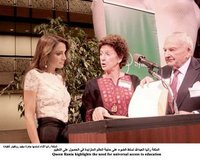I just finished watching the all-Jordanian Netflix series Al-Rawabi School, and my mind is racing. So many mixed emotions: surprise, nostalgia, excitement, sadness, fear, inspiration, but above all, elation.
Elation to hear the dialect of my home featured in a highly-produced, beautifully-shot, professionally-made series. Elation that against all odds; conflict, wars, pandemic, poverty, unemployment, and one disaster after the other, miracles do still happen in Jordan, in the country that could.
Al-Rawabi School exceeded all my expectations, from the story line with sophisticated character development, to the beautiful cinematography, to the all-girl school setting, and the excellent performance by the young, mostly-unknown cast, the show was an unexpected gem.
Al-Rawbi School tackled so many important and timely topics in Jordan and elsewhere: bullying, jealousy, revenge, friendship, sexual harassment, domestic abuse, patriarchy, and honor crimes.
Hearing very Jordanian words, and expressions like shagfeh, binshalf, shu bilnisbeh just made my heart sing, and put nostalgic tears in my eyes. Also, The inclusion of “Arabish,” the mix of English and Arabic vernacular is spot on, and an exact representation of how West Ammanites speak.
Seeing the beautiful familiar streets and neighborhoods of Amman made me want to savor every single minute of this unique show, and watch it again and again.
What made the show very relatable to me is the fact that I too grew up in West Amman, in an all-girl private school, I went through similar issues. I was both bullied and a bully. I was hurt and hurt others. I’m grateful that this period is all behind me now, and that somehow I had survived it unscathed.
The score is yet another marvel. The choice of eclectic Arabic music was top notch with a variety of independent and veteran Arab artists. I have been listening to the show’s play list on Spotify non-stop for days now along with my kids in the car, and we are all enjoying the tunes and signing along to the music.
As expected, the show generated some criticism, especially among those who believe that it didn’t represent “Jordan’s traditions and culture”. From what I saw, the criticism was minor compared to the huge support and reception it received.
To those who criticize the show, I would say everything in this show is an exact representation of Jordanian culture and tradition, this show couldn’t be more Jordanian.
The show might not be perfect, but is perfection what we are looking for here? If I really want to nitpick, I might say that the choice of the all-gothic look for the character Nouf was a bit over the top, and the character of the drunken dad slurring his words was a bit cliched, but these are really very minor things in the scheme of things. The show is a marvel
Kudos to everyone behind this all-Jordanian show, especially its young creator Tina Shomali, and of course all the brilliant young actress and their families who supported them.
Jordan, onwards and upwards. Jordan, you are definitely the little country that could.





